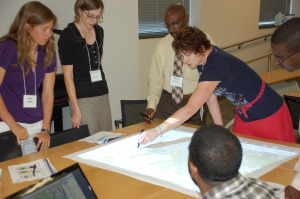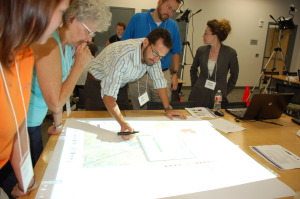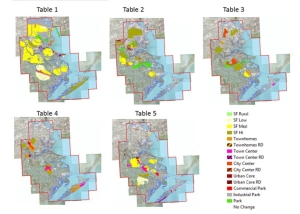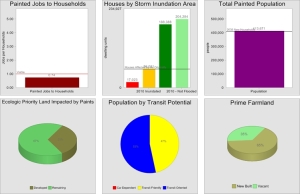Community Health And Resource Management
What is CHARM?
CHARM is the Community Health And Resource Management mapping application (PDF). It gives local officials, stakeholders, and citizens the power to map and analyze growth with real-time feedback. When used with the weTable, it forms a powerful planning tool for engaging the public and gathering their values about the community’s future. The mapping application is supported with a library of mapping data about urbanization, storm surges, conservation, public facilities, and coastal resources. The CHARM application can leverage local community knowledge for better long-term planning, and is an ideal tool for communities, watersheds, and environmental projects along the US Gulf Coast.
CHARM Workshops
A CHARM workshop is a planning workshop for looking at long-term growth and development. How can we plan for a safe, resilient future? Where should growth be encouraged and where it should be avoided? What does the health of our watersheds and coasts look like with 5,000 new homes? 100,000? Where does it makes sense to grow sideways, where do we grow inward, and where do we grow upward? Which areas are particularly vulnerable to flooding and surges? What do we want to conserve for future generations? CHARM helps communities see how planning decisions made today will impact tomorrow’s environment and community. CHARM includes over three dozen indicators for assessing planning decisions.
Each workshop begins with a long-term population target and a time frame. Participants select areas on the map to target for development and apply a development style. CHARM takes that information and calculates in real-time a host of planning impacts. Each table works as a team to create their custom plan, all while exploring data, talking about what matters to them, and learning as they listen to others. The exercise continues until participants hit their growth targets. The final results can be compiled and tables can share strategies and ideas. Input and priorities gathered from the workshop are used to inform the development of planning recommendations.
TCWP’s CHARM Program
Local officials and resource agencies are seeking new ways to involve the public on coastal planning issues. It is the objective of the CHARM program to facilitate that through the sharing of tools and mapping information. The CHARM mapping application supports community planning in a public workshop setting. The tool works at local and regional scales and can address multi-year and multi-decade planning horizons. It is ideal for comprehensive plans, watershed plans, general land use plans, and coastal resource planning. Because we have a standing, in-house gulf-wide database of spatial data and a shareable template for the mapping application, new scenario planning workshops can be quickly developed for any area on the US Gulf coast. This means that planning partners in the community can focus on organizing and outreach, not data management or technology.
Software & Data
 CHARM is an ArcGIS-based application made possible by mapping software. Some GIS skills are needed to set up and monitor the system during a workshop, and table facilitators with GIS skills are always helpful. But workshop participants–local officials, stakeholders, and everyday citizens–need no special skills to use the mapping application. CHARM data uses a variety of data sets that are important for planning. If you’re interested in the technical details, visit our site again in the coming months. We promise to have a behind the scenes look at the data and tools that supports of CHARM.
CHARM is an ArcGIS-based application made possible by mapping software. Some GIS skills are needed to set up and monitor the system during a workshop, and table facilitators with GIS skills are always helpful. But workshop participants–local officials, stakeholders, and everyday citizens–need no special skills to use the mapping application. CHARM data uses a variety of data sets that are important for planning. If you’re interested in the technical details, visit our site again in the coming months. We promise to have a behind the scenes look at the data and tools that supports of CHARM.
Software puts development in public’s hands. The Houston Chronicle. June 06, 2011.
Dr. John Jacob and Steven Mikulencak interviewed with Agrilife Today to discuss how CHARM helps community planners and local residents understand the impact of planning decisions on water resources and climate change.
A case study from our partners at Placeways LLC, “Coastal Resiliency Seminar“
 Texas Community Watershed Partners
Texas Community Watershed Partners 




